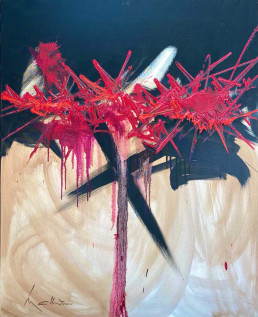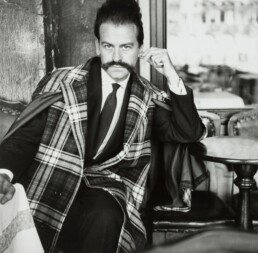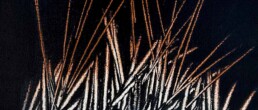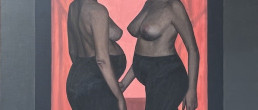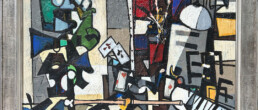Georges Mathieu
1921 (Boulogne-sur-mer) - 2012 (Boulogne-Billancourt)
Biography
Georges Mathieu, born January 27, 1921 in Boulogne-sur-Mer and died June 10, 2012 in Boulogne-Billancourt, is a French painter considered as one of the fathers of Lyrical Abstraction. Mathieu studied literature and philosophy before switching to art at the age of twenty-one. After painting realistic landscapes and portraits, he developed a highly distinctive Abstract Expressionist personal style, which grew out of an emotionally driven, improvised and intuitive act of painting. In 1947 Mathieu joined forces with Camille Bryen to organise an exhibition of the Tachist-oriented work he designated Non-Figuration Psychique. The paintings of Mathieu‘s he called Lyrical Abstractions are beyond the constraints of tradition and formal regulative systems, placing Georges Mathieu with Fautrier and Dubuffet as one of the most important exponents of French Informel art.
Up to 1951 Mathieu continued to organise group shows, using them to demonstrate as one of the first Europeans to do so the importance of American Abstract Expressionism. Georges Mathieu was particularly interested in Jackson Pollock and his spontaneous gesture handling of paint. From 1954 Mathieu staged the painting of large-scale works as theatrical events, culminating in his using 800 tubes of paint to create a painting measuring 4 x12 metresin front of an audience of 2000 at the Theatre Sarah-Bernhardt in 1956.
Somewhere between Happening and Action Painting, Mathieu succeeded in producing a decoratively linear painting reminiscent of calligraphy. Mathieu continued to perform his Action Paintings throughout Europe and, in 1957, in Tokyo to universal acclaim ; his works were shown at special exhibitions in Paris and New York in 1950 and 1952. Mathieu participated in numerous international exhibitions with one-man shows, including Documenta II in 1959. Early in the 1960s Georges Mathieu also did sculpture and designed furniture, tapestries and frescoes. An art theorist as well as an artist, Georges Mathieu made a name for himself as the founder of Tachism in the essay ‘Au-delà du Tachisme’ (published in 1963).


